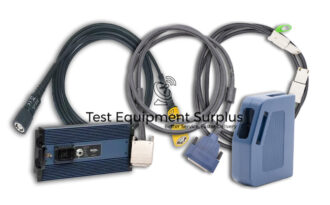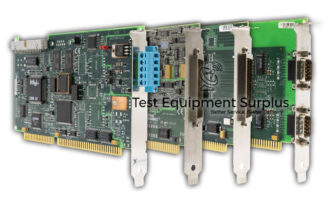Description
The National Instruments VXI-8360LT Remote Control Module, with part number 782002-01, is a high-performance MXI-Express Remote Control Module designed for use in VXI systems. This module requires only a single VXI C-size slot for installation and supports advanced features such as LXI-Wired Trigger and MXI-Express x1 interface.
Equipped with three SMB type connectors on its front panel, the module allows for trigger input, trigger output, and CLK10 I/O signals. Users can also take advantage of its capability to daisy-chain up to eight CLK10 and/or TTL triggers using the trigger bus ports, enhancing system scalability.
An essential tool included with the VXI-8360LT is the Resman diagnostics utility, which ensures the system is correctly configured and operational. Additionally, the module integrates an EEPROM that retains the default register values for the VXI circuitry, enabling the module to be operational within 5 seconds following a system reset.
For CLK10 timing signals, users can select between the internal CLK10 oscillator or the EXT CLK connector, providing flexibility for various system configurations.
| Specification | Details |
|---|---|
| Product Name | National Instruments VXI-8360LT Remote Control Module for VXI |
| Part Number | 782002-01 |
| Type | MXI-Express Remote Control Module |
| Slot Requirement | Single VXI C-size slot |
| Supported Features | LXI-Wired Trigger, MXI-Express x1 |
| Front Panel Connectors | Three SMB type connectors (trigger input, trigger output, CLK10 I/O signals) |
| Trigger Bus Ports | Daisy-chain up to eight CLK10 and/or TTL triggers |
| Diagnostics Utility | Resman |
| EEPROM | Integrated, stores default VXI circuitry register values |
| Operational Readiness Time | Within 5 seconds after system reset |
| CLK10 Sources | Internal CLK10 oscillator, EXT CLK connector |
Question 1: How does the National Instruments VXI-8360LT Module enhance system scalability with regard to trigger signals?
Answer 1: The National Instruments VXI-8360LT Module enhances system scalability with regard to trigger signals by allowing users to daisy-chain up to eight CLK10 and/or TTL triggers using the trigger bus ports.
Question 2: What is the function of the EEPROM integrated within the National Instruments VXI-8360LT Remote Control Module, and how does this feature benefit the module’s operation after a system reset?
Answer 2: The purpose of the Resman diagnostics utility included with the National Instruments VXI-8360LT Remote Control Module is to ensure that the system is correctly configured and operational.
Question 3: What advanced features does the National Instruments VXI-8360LT Remote Control Module support, and how does its Resman diagnostics utility benefit the user?
Answer 3: The National Instruments VXI-8360LT Remote Control Module supports advanced features such as LXI-Wired Trigger and MXI-Express x1 interface, and its daisy-chaining capability enhances system scalability by allowing users to connect up to eight CLK10 and/or TTL triggers using the trigger bus ports, thus enabling the integration of multiple modules without requiring additional slots for each connection.
Question 4: What advanced features are supported by the National Instruments VXI-8360LT Remote Control Module and how does its daisy-chaining capability enhance system scalability?
Answer 4: The National Instruments VXI-8360LT Remote Control Module supports advanced features such as LXI-Wired Trigger and MXI-Express x1 interface, and its Resman diagnostics utility benefits the user by ensuring the system is correctly configured and operational, thus facilitating maintenance and troubleshooting.
Question 5: What is the purpose of the Resman diagnostics utility included with the National Instruments VXI-8360LT Remote Control Module?
Answer 5: The EEPROM integrated within the National Instruments VXI-8360LT Remote Control Module retains the default register values for the VXI circuitry, which benefits the module’s operation after a system reset by enabling it to become operational within 5 seconds, thus ensuring a quick recovery and minimizing downtime.





